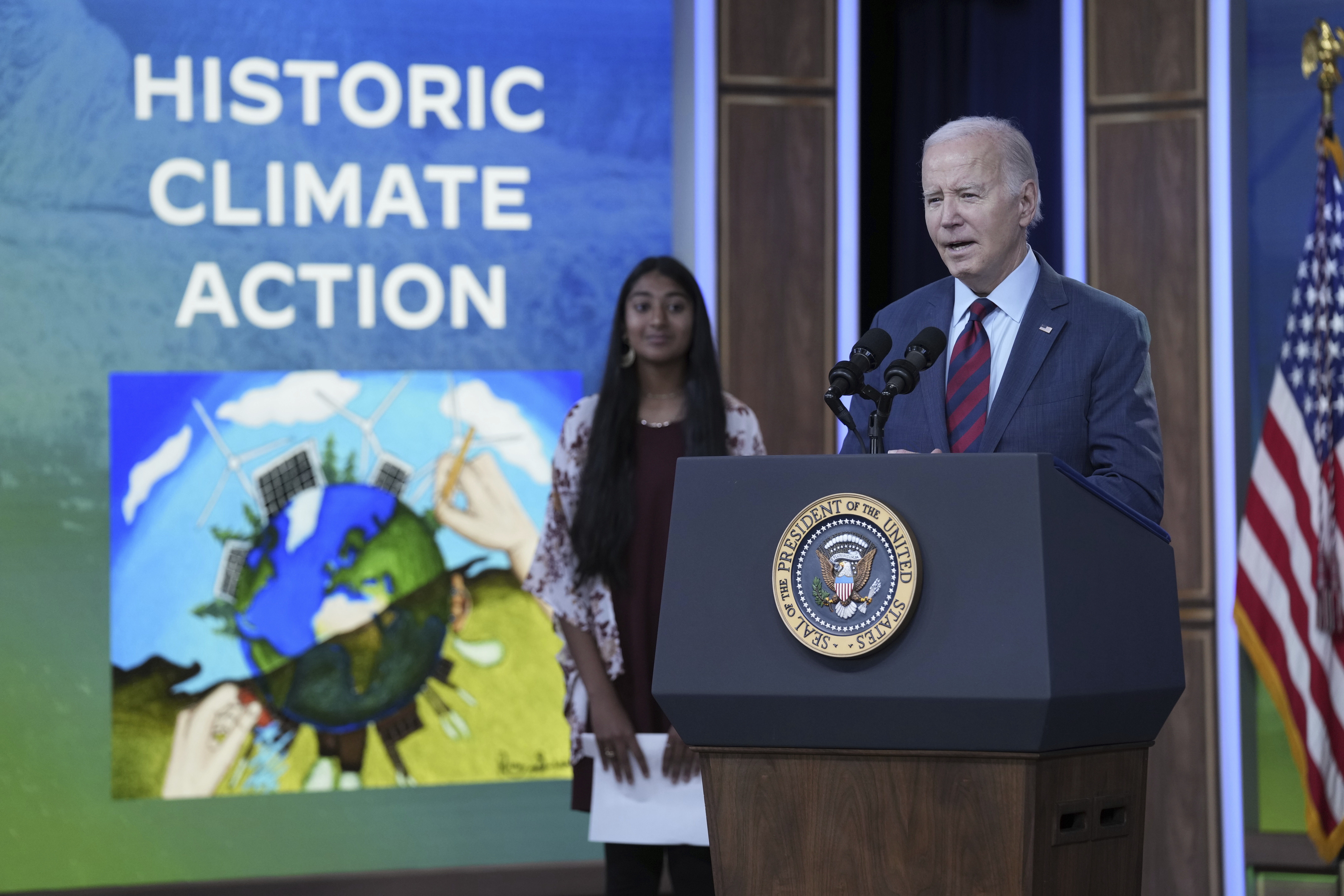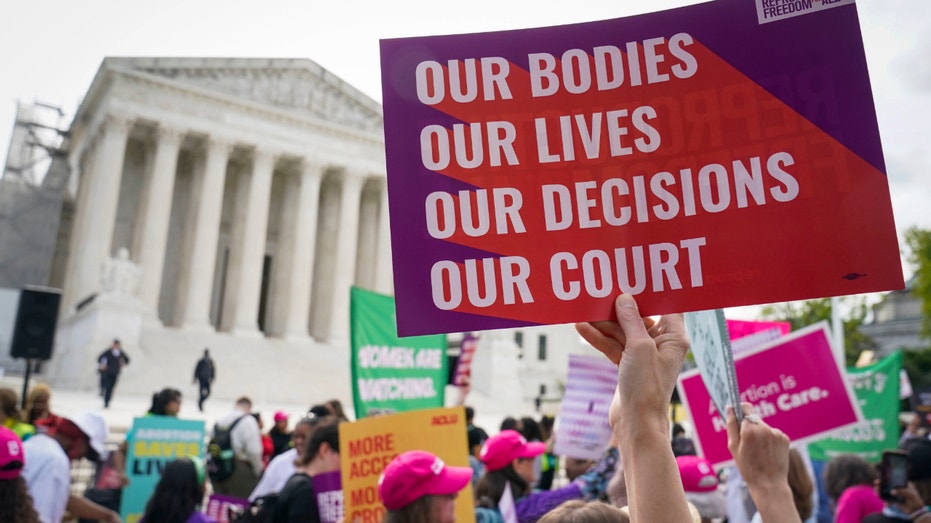Biden vs. Trump: Do young climate voters care?
Biden, who signed the biggest climate law in U.S. history, has angered environmentalists by approving fossil fuel projects. Now, the head of one group says, "I’m worried about getting climate activists back."


Environmental activists urging President Joe Biden to wage a stronger fight against climate change are facing an agonizing strategic decision: How hard can they push him without risking throwing the election to Donald Trump?
Despite delivering the largest-ever investment in climate action through Congress, pouring hundreds of billions of dollars into technologies such as wind power and electric cars, Biden and his appointees have faced loud protests from activists dismayed by administration actions boosting oil and gas production. Unhappiness is especially rife among the young climate-minded voters who Democrats worry will either sit out the November election or back a third-party candidate.
Biden has made recent moves to shore up his support from the Democrats’ green wing, including a pause on new approvals for natural gas export projects. But environmental leaders wonder how aggressively they can prod Biden to go further without causing fatal damage to his campaign — for instance, by pressuring him into positions that would feed Trump’s accusations that his green agenda is endangering the economy.
Protests decrying the administration’s pro-fossil-fuel actions also run the risk of further demoralizing activists who see any compromises as dooming the planet.
“I’m worried about getting climate activists back,” said Erich Pica, president of Friends of the Earth Action, a group that has sharply criticized Biden’s decisions to back fossil fuel infrastructure projects. Given some activists’ doubts about Biden, “I think that is something that the campaign itself has to answer.”
Biden campaign spokesperson Lauren Hitt declined to discuss activists’ responses to the president’s fossil fuel moves. She said in an email that “the President’s climate policy is motivated by common sense.”
But Biden’s challenge was evident Monday when 100 members of the youth-led climate group Sunrise Movement descended on his campaign’s headquarters in Wilmington, Delaware. Police arrested 20 protesters who had entered the campaign office with signs imploring Biden to “Lead or Lose” and to fund climate efforts rather than sending money to Israel.
The activists also demanded that the president declare a “climate emergency.” That move, they said, would unlock executive powers allowing Biden to cancel fossil fuel development on federal lands and direct manufacturers to make renewable energy products.
“Young people have set the bar for what it’s going to take to turn on our generation and mobilize young people to go out to the polls at the level that we did in 2020,” said Stevie O’Hanlon, a spokesperson with Sunrise. “And Joe Biden’s campaign seems to be out of touch with how high that bar is.”
With Biden trailing Trump in several national polls, one of the last things the president needs is part of his base visibly causing confrontation, said Mark Longabaugh, a Democratic strategist who had advised Vermont Sen. Bernie Sanders’ 2016 presidential campaign.
“For these guys to hold a protest, at this moment, creates a nuisance that can be debilitating,” Longabaugh said.
On the other hand, protests offer Biden an opportunity to explain how his administration is addressing climate and clean energy, said Stanley Greenberg, a Democratic strategist who has also performed climate polling in other countries.
But Greenberg cautioned Biden against taking strident positions given voters' sensitivity to energy price swings that could leave him “marginalized.” He instead suggested that Biden lean into how his administration is investing in cleaner energy sources — a move the public broadly supports.
“The right entry point is that people want change and we are in fact leading the change on the climate issue, on the transition to net-zero,” he said.
Young climate protesters have repeatedly registered their disapproval of the president’s actions, disrupting countless appearances by Biden officials and Democratic lawmakers to demand that the administration block projects that his appointees eventually approved. Those include the 600-million-barrel Willow oil project in Alaska, which the Interior Department greenlit last March, and the Mountain Valley Pipeline, which would carry gas from Appalachia to the East Coast. U.S. oil production has reached record highs under Biden, while the country has emerged as the world’s top natural gas exporter.
But O’Hanlon acknowledged a real risk that actions such as Sunrise’s headquarters protest could make Biden appear weak and even more unpopular — something that would benefit Trump, who has pledged an all-out assault on Biden’s climate policies.
Sunrise is going through an internal process of figuring out how fiercely it should push, O’Hanlon said. “It’s hard to say right now exactly how we’ll walk that line."
Polls reflect the disillusionment that this highly active group of voters feels with Biden, driven by what they see as his inadequate progress and broken promises on climate change.
Biden’s approval rating sits at 39 percent for people between 18 and 29 years old, according to a Harvard Kennedy School Institute of Politics youth vote poll released in December. Just 39 percent of that group trusts his handling of climate change. (Only 19 percent said they trust Trump on the issue, while 41 percent picked “neither.”)
Past elections offer Democrats reason to fear this unhappiness could hurt Biden’s campaign. During the 2000 race, anger among many South Florida environmentalists over a proposed Air Force base redevelopment near the Everglades helped drive voters to Green Party candidate Ralph Nader, and even prompted Vice President Al Gore to cut back on planned campaign appearances in the state for fear of being met by embarrassing protests. Nader grabbed more than 97,000 votes in the deciding swing state state, which Gore lost to George W. Bush by 537 votes.
Then as now, the Democratic nominee’s critics on the progressive left bridle at being asked to settle for the status quo.
“If the line goes, ‘Look at all we’ve done. You should be satisfied,’ that never works with people,” said Jamie Henn, a longtime climate organizer who is director of advocacy group Fossil Free Media.
Biden’s environmental supporters disagree on how best to motivate voters who are concerned about climate change to turn out for the president. One faction of the environmental movement is confident that touting Biden’s accomplishments will help voters realize his climate record is unparalleled. But the more progressive flank is betting that public confrontation and unrelenting pressure will coax Biden into even more aggressive action that excites people still on the sidelines.
The groups all agree on one thing: Electing Trump would be devastating for meeting U.S. climate goals. But that is not animating voters who see such framing as picking the lesser of two evils — including some who are also motivated by Biden’s other policies, such as support for Israel.
“Some people may disagree with a couple of decisions in particular,” said Tiernan Sittenfeld, senior vice president of government affairs with the League of Conservation Voters, whose political action committee, LCV Action Fund, endorsed Biden’s reelection last year.
But, she said, when it comes to defeating Trump, “this choice could not be more clear: The president who has done more on climate than any other by far, or the most anti-environmental president ever.”
But Pica said voter education efforts championing Biden’s environmental accomplishments are unlikely to sway the disaffected activists. Those people are already highly engaged in the political process and want to see Biden take more drastic action to curtail fossil fuel infrastructure, he said.
“Just talking about clean energy or regulatory pieces I don’t think are enough to bring those folks along,” he said. “And many of those folks are in swing states that will matter.”
On the other hand, some of Biden’s actions have drawn a positive response from environmental activists. After he announced the pause on new gas export permits — so his agencies can reassess the exports’ climate and economic impacts — a number of groups canceled a sit-in they had planned to hold at the Energy Department.
Instead, roughly 300 people — including some who had flown in for the sit-in — and lawmakers like Reps. Alexandria Ocasio-Cortez (D-N.Y.) and Pramila Jayapal (D-Wash.) and Sen. Ed Markey (D-Mass.) gathered at a Capitol Hill-area dive bar to celebrate the fifth anniversary of the introduction of the Green New Deal resolution. Congress never enacted that suite of climate and social proposals, though many of its environmental ideas eventually found their way into the Inflation Reduction Act, Biden’s signature climate law. (Trump has conflated the two, denouncing Biden’s policies as the "Green New Scam.")
“These investments lower energy costs, create jobs, increase energy independence and protect our natural resources for future generations to enjoy,” said Hitt, Biden’s spokesperson.
Biden exceeded the expectations of many in the climate community with the IRA, along with the 2021 infrastructure law that included more than $40 billion for adapting to rising seas, wildfires and drought, said David Kieve, president of the Environmental Defense Fund Action. And the administration is finishing rules that aim to clamp down on climate pollution from cars and power plants.
Kieve, who served in Biden’s Council on Environmental Quality after leading environmental outreach on the president’s 2020 campaign, said his organization plans to underscore that Biden’s “motive” is clear: He wants to do more on climate, which is the opposite of Trump.
Biden “has passed my test of being more committed on climate than any president in history has,” Kieve said. “And I think there’s some storytelling that needs to be done around that.”



